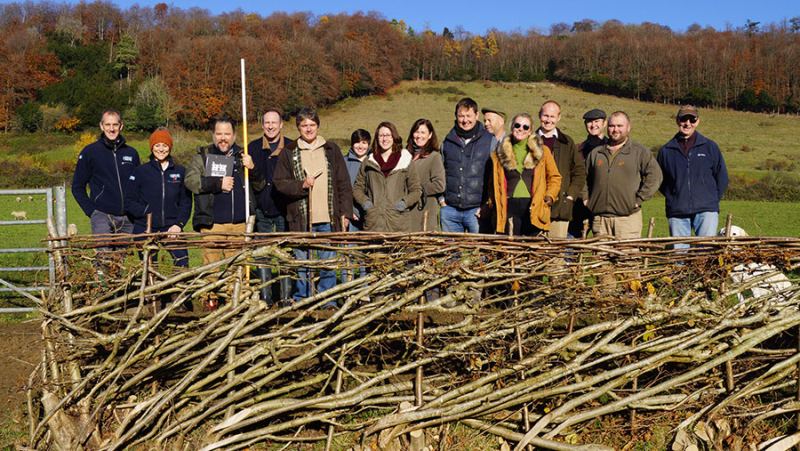
The ancient art of hedge-laying was the focus at an official launch of a new project aimed at conserving and restoring this vital wildlife habitat often seen on farmlands.
Farmers and land managers joined Surrey Wildlife Trust's Hedgerow Heroes project on a farm near Dorking, Surrey to support the campaign to save the county’s precious hedgerow network.
Hugh Broom, who farms at Milton Court Farm in Westcott, has planted over 3,000 metres of new hedgerows on his land. He’s also restored old hedges and hosted traditional hedge-laying competitions on the farm.
“Hedgerows provide a fantastic amount of habitat, as well as being a useful landscape tool – they make great livestock barriers and help us to keep dogs and walkers on the paths,” he said.
“They are really versatile and we are doing all we can to enhance them for the future – it would be great if we could get the wider community involved to help with surveying, planting and laying hedgerows.”
Since the Second World War more than 120,000km of hedgerows have been lost nationwide through intensive farming and development. Many hedges that remain are being damaged by over cutting or neglect.
The Hedgerow Heroes project will train volunteers in survey and traditional management techniques - they will also plant new hedgerows in some areas. Information collected will be used to build up a database of information about the current state of the county’s hedgerows.
'Vitally important'
Jim Jones, the Trust’s Living Landscapes Manager, is heading the campaign: “Hedgerows are vitally important for lots of different species, providing excellent habitat for dormice and commuting routes for bats. Hedgehogs use them for foraging and shelter and they are a magnet for birds and bees,” he said.
“Hedgerows form vital natural highways, enabling wildlife to move around. They provide a range of other benefits to landowners such as flood management, soil protection and wood fuel.
“But hedgerows are very under-recorded in Surrey. A lot of them may be in a very poor state – a survey suggested just seven per cent are in good condition - and that needs to change.”
Skip Mugridge from Brookwood is a member of Surrey Hedgelaying Group and first learnt traditional hedge management techniques as a Surrey Wildlife Trust volunteer. He said he believes anyone can learn how to lay a hedge and is keen to keep the age-old skill alive.
“There are so many hedges that need laying, so the more people we can get interested in this, the better it will be for the environment – not forgetting the exercise and the camaraderie you get from it,” he said.
“It is quite a physical exercise and every hedge is different. It’s always a test to see what you can make of a hedge – it can look really fantastic when you’ve finished!”
